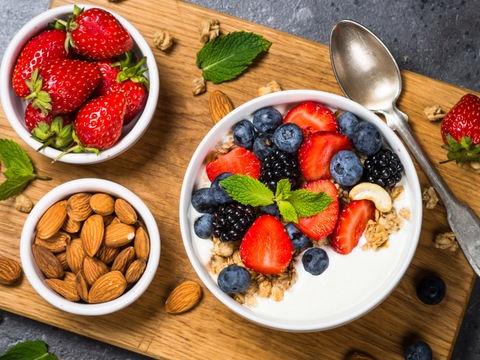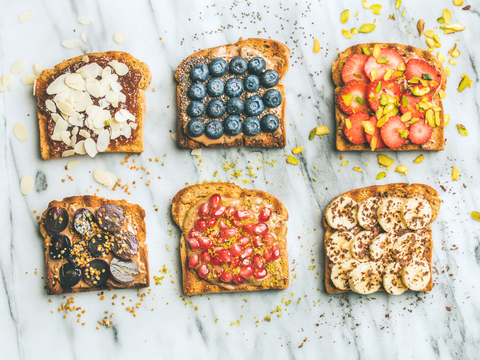Why is breakfast so important?
Breakfast is often called “the most important meal of the day.” It helps provide energy to fuel morning activities and consuming breakfast has also been associated with numerous health benefits.
Previous research has shown that the type of fat consumed can play a role in the production of inflammation-related factors, and it’s also been suggested that not only the type of fat, but also the timing of fat intake can impact these factors. Some recent studies have also shown that the timing nutrient intake may be significant. It’s been shown in certain studies such as (this one and this one) that eating the most of one’s calories and nutrients during the day rather than at night has been associated with a lower risk of having overweight or obesity, as this helps protect against disrupting the body’s circadian rhythm, which a growing body of evidence has shown plays an important role in metabolism.
Is it bad to eat late at night?
Eating most of one’s calories at night and consistent late-night eating in general, especially if one eats until very close to the time they go to bed, has been linked to increased risk of metabolic syndrome, insulin resistance, and cardiometabolic disease. For example, research has suggested that one way skipping breakfast may make the body less efficient and processing fat has to do with this disruption to circadian rhythm and its cascading effects on function of the liver, which plays a key role in metabolizing fat. In one study, consuming fish oil at breakfast was associated with improvement in triglyceride levels. In another study, having a higher calorie breakfast and lower calorie dinner contributed to greater weight loss and decreased weight circumference in individuals with overweight or obesity.
Consuming adequate dietary fat is important for normal body function, protecting our organs, and for temperature regulation. It also aids in nutrient absorption, hormone production, blood sugar regulation, and satiety. While all type of fats provide 9 calories per gra, there are different types of fat that have been shown to impact human health in different ways. it provides 9 calories per gram, and then how different fats impact health (ex: cholesterol)
What is MUFA?
- Monounsaturated Fatty Acids (MUFAs) are found in foods like olives and olive oil, avocado, some nuts and seeds (ex: almonds, pecans, pumpkin seeds), and canola oil.
What is PUFA?
- Polyunsaturated Fatty Acids (PUFAs) are found in such foods as oily fish, some nuts and seeds (Ex: walnuts, flax, chia), canola oil, sunflower seed oil, soybeans, and soybean oil.
What is SFA?
- Saturated Fatty Acids (SFAs) are found in foods such as red meats, lard and other forms of animal fat, full fat dairy, and coconut.
What are trans fats?
- Trans Fats are found in hydrogenated fats used in highly processed foods.Their inflammatory effect has been well established in previous research and they were not included in this study.
The Benefits of a High-MUFA Breakfast
A 2023 study published in the special Dietary Assessment for Weight Management and Maintaining Health issue of nutrients looked at whether altering the type of fat consumed at breakfast impacted inflammatory markers. In this 3-month crossover randomized trial, 60 institutionalized women aged 64 ± 18 years, with a BMI of 27.79 ± 3.97 kg/m2, alternately consumed three different breakfasts. One was rich in polyunsaturated fatty acids (PUFA) from 20 grams of margarine, monounsaturated fatty acids (MUFA) from 20 grams of virgin olive oil, or saturated fatty acids (SFA) from 20 grams of butter. They were randomized to take one of three different breakfasts for 30 consecutive days, after which there was a 45-day washout period before they were given another breakfast for 30 days and so on so each participant consumed each breakfast for 30 days at a time. After each intervention period, several inflammatory inflammatory markers were evaluated: epidermal growth factor (EGF), interferon (IFN)-α, interleukin (IL)-1α, IL-1β, IL-2, IL-4, IL-6, IL-8, IL-10, monocyte chemoattractant protein-1 (MCP-1), tumor necrosis factor (TNF)-α, C-reactive protein (CRP), and vascular/endothelial growth factor (VEGF).
The high-MUFA breakfast was shown to have the most significant effects on these inflammatory markers. There was a statistically significant decrease in plasma IL-6 (p = 0.016) and VEGF values (p = 0.035). Some of the other factors measured, including IL-1α and CRP, also decreased substantially. However, these results were not statistically significant.
The high-PUFA breakfast was associated with a significant decrease in EGF levels (p < 0.001), and the high-SFA breakfast was shown to have no apparent effect on these inflammatory factors. These results suggest that increasing MUFA or PUFA intake appears to help reduce inflammatory factors, which may be beneficial for improving risk of inflammation-driven health issues, such as cardiovascular disease.
It’s important to note, however, that this study did have a few limitations. This was a female-only small study of only 60 women. It’s also worth noting that these women were institutionalized so it was easier to control for other variations in dietary intake.
High-MUFA Breakfast Ideas for Everyday Life
It can be very easy to make a high-MUFA breakfast part of your daily routine. Ideally, breakfast should provide a combination of protein, fat, and fiber to stabilize blood sugar, which helps you stay full, energized, and focused and which also supports improved blood glucose control throughout the rest of the day. It’s also a great opportunity to work in a variety of polyphenol-rich foods to reap their anti-inflammatory and antioxidant benefits.
Here are just a few ideas to get you started:
- 2-Egg Spinach and Tomato Omelette Cooked in Olive Oil, garnished with feta cheese and served with a side of berries

- Savory Cottage Cheese Bowl with cherry tomatoes, cucumber, pepper, and ½ an avocado, drizzled with olive oil
- Whole grain toast with ½ an avocado, tomatoes, smoked salmon or eggs (or hemp hearts for a plant-based version), and drizzled with olive oil
- Plain Greek yogurt with seasonal fruit and pumpkin seeds or almonds drizzled in olive oil (!!!)

- Whole grain toast with almond butter and berries

Remember, the disease risk reduction benefits of food is about diet patterns. While an occasional treat is absolutely fine, aim to make nutrient-dense meals your day-to-day habit.
FAQs
What are the 5 MUFAs?
The five MUFAs are monounsaturated fatty acids found in foods like olive oil, avocados, nuts, seeds, and dark chocolate. These healthy fats can improve heart health, reduce inflammation, and aid in weight management when consumed in moderation as part of a balanced diet.
What is a good high fat breakfast?
A good high-fat breakfast includes foods like eggs, avocado, Greek yogurt, chia seeds, olive oil, and nuts. These provide a mix of healthy fats, protein, and fiber for sustained energy and satiety. Pairing them with whole grains and fruits can create a balanced and nutritious meal to start the day.
What is the best breakfast for losing belly fat?
The best breakfast for losing belly fat includes a combination of high-fiber foods, lean protein, and healthy fats such as extra virgin olive oil. Examples include a spinach and mushroom omelette with whole-grain toast, a Greek yogurt with berries and nuts drizzled with olive oil, or oatmeal with almond butter and flaxseeds. Avoiding sugary and processed foods is also important for reducing belly fat.
What breakfast foods are high in fiber for flat stomach?
Breakfast foods high in fiber for a flat stomach include chia seeds, flaxseeds, oatmeal, whole-grain cereal, and berries. These foods help promote digestion, reduce bloating, and support weight loss goals. Pairing them with protein and healthy fats can create a balanced and filling meal for a flat stomach. Try our Spiced Ginger Grain-free Granola!
Which is more healthier, MUFA or PUFA?
MUFA and PUFA, both types of healthy fats, offer various health benefits. MUFA, with a single double bond in its carbon chain, has been shown to help lower bad cholesterol levels and reduce the risk of heart disease. PUFA, which contains multiple double bonds, helps promote brain health, reduce inflammation, and support heart health.
How does MUFA affect cholesterol?
Monounsaturated fatty acids (MUFA) may lower bad cholesterol levels (LDL) and reduce the risk of heart disease. Research suggests that MUFA-rich diets can decrease levels of total cholesterol and LDL cholesterol while increasing levels of good cholesterol (HDL).
Is MUFA a bad fat?
No, monounsaturated fatty acids (MUFA) are not considered bad fats. In fact, MUFA is a type of healthy fat that can have positive effects on heart health. It is found in foods like avocados, olive oil, nuts, and seeds, and is associated with various health benefits.





